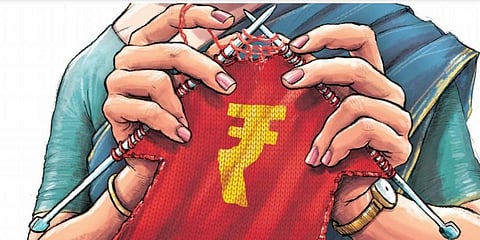

With the second wave of the pandemic on the retreat and the consequent easing of supply-side restrictions, there are visible signs of the growth momentum returning to the economy. This is borne out from the latest GDP print, which shows that the economy has notched a 20.1% expansion during Q1 2021-22. Although powered by a low base, the GDP number is remarkably robust and demonstrates that the economy is slowly but surely coming back to the pre-pandemic level.
The disaggregation of GDP numbers indicates that recovery, though broad-based, is focused on certain sectors. While manufacturing has recorded an impressive 49.6% growth, some of the employment-intensive sectors such as construction and trade, hotels, transport, and communications have also performed well. On the flip side, the performance of the financial, real estate and professional services as well as public administration, defence and other sectors have been disappointing.
There are other distinct markers that indicate that the economy is on the mend. For one, in nine out of the last 10 months, revenue collections from GST have crossed `1 lakh crore. Similarly, Q1 corporate profits are on an upswing. Exports are showing resurgence while power generation, steel consumption and sale of commercial vehicles, among others, are showing an upward momentum. While a third wave could pose another challenge, it is expected that the country is sufficiently geared up to ensure that the template of an ascending economy remains in place. The government also needs to be complimented for taking timely measures under the Atmanirbhar Bharat package to boost the economy. The loan guarantee scheme for stressed sectors such as healthcare, travel and tourism, and agriculture has done much to help the sectors restart business and get the economy back on the revival trajectory. The PLI Scheme of the government is also evincing considerable interest. Similarly, the repeal of retrospective taxation would cement India’s position as a reliable investment destination. And the Factoring Regulation (Amendment) Bill would help MSMEs in meeting their working capital requirements.
The recently announced National Monetisation Pipeline (NMP), which would provide a roadmap for monetising the assets of the government and the public sector, would go a long way to finance mega projects such as the National Infrastructure Pipeline (NIP) in coming times.
While the macroeconomic numbers continue to recover, it is the right time to provide a big push to measures that would generate demand and sustain the growth momentum of the economy. And the immediate source of demand generation, at this juncture, is to step up capital expenditure. The government should retain its focus on capital spending on infrastructure projects that, through a multiplier effect, would rekindle the investment cycle.
However, despite the need to revive aggregate demand by capital spending, government expenditure continues to be on a tight leash owing to fiscal deficit concerns. Capital expenditure, for instance, is at 23.2% of the BE during April-July 2021 as against 27.1% last year. Total expenditure during the four months of the year is at 28.8% of the BE even as revenue receipts jumped by 37.4% during the period. When taken together with the high tax on fuel, this could depress demand. It is hoped that the government would frontload the public expenditure on infrastructure development that is already committed in the Budget. The fiscal deficit can be tapered in a phased manner to achieve the target of 6.8% set for this year.
Simultaneously, the private sector should be incentivised to join the government’s drive on infrastructure investment to enhance demand. This would require that some of the issues faced by the private sector be addressed. This includes implementing the Kelkar Committee recommendations on public-private partnerships such as ensuring sanctity of contracts and faster resolution of long-pending disputes and litigations, among others. The government could consider setting up many more commercial Dispute Resolution Courts specialising in infrastructure sector-related disputes.
The government should also take steps to unlock private capital by addressing issues relating to delayed payments. The most direct way that the government can put money into the economy and revive demand is through payment of its pending bills to service providers. The government should release all its dues, whether outstanding payments or tax refunds to industry, immediately. Further, all outstanding payments should also be released by the state governments and other service providers. A cell could be created within the MoF to monitor timely clearance of dues.
The Trade Receivables Discounting System (TReDS) should be actively used for settling the delayed payments to MSMEs. In fact, the passing of the Factoring Amendment Bill has strengthened the TReDS platform and made it more accessible for MSMEs that are looking for timely payments against their receivables. Faster IBC resolution is yet another powerful tool to unlock liquidity for which the infrastructure and capacity of NCLT Benches should be strengthened. The government has taken many steps to support the MSMEs including the ECLGS. Further measures such as expediting the Fund of Funds scheme for equity support and revival of Credit Linked Capital Subsidy Scheme for technology upgradation should be considered.
Finally, the accelerated pace of vaccination should continue to prevent the third wave and help retain the steadfast focus on the economy. It is at a crucial juncture today. It needs the right policy interventions from the government to bring the investment cycle back on track and lead the economy to the path of growth. Some work on this has happened. But there is more to be done.
Chandrajit Banerjee
Director-General, CII
(cb@cii.in)